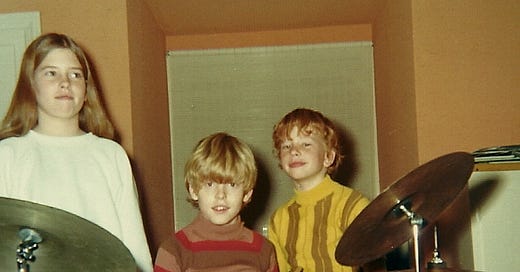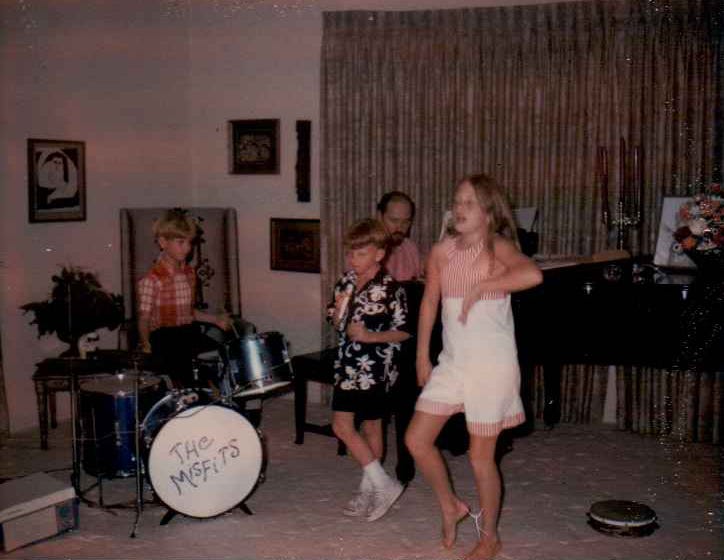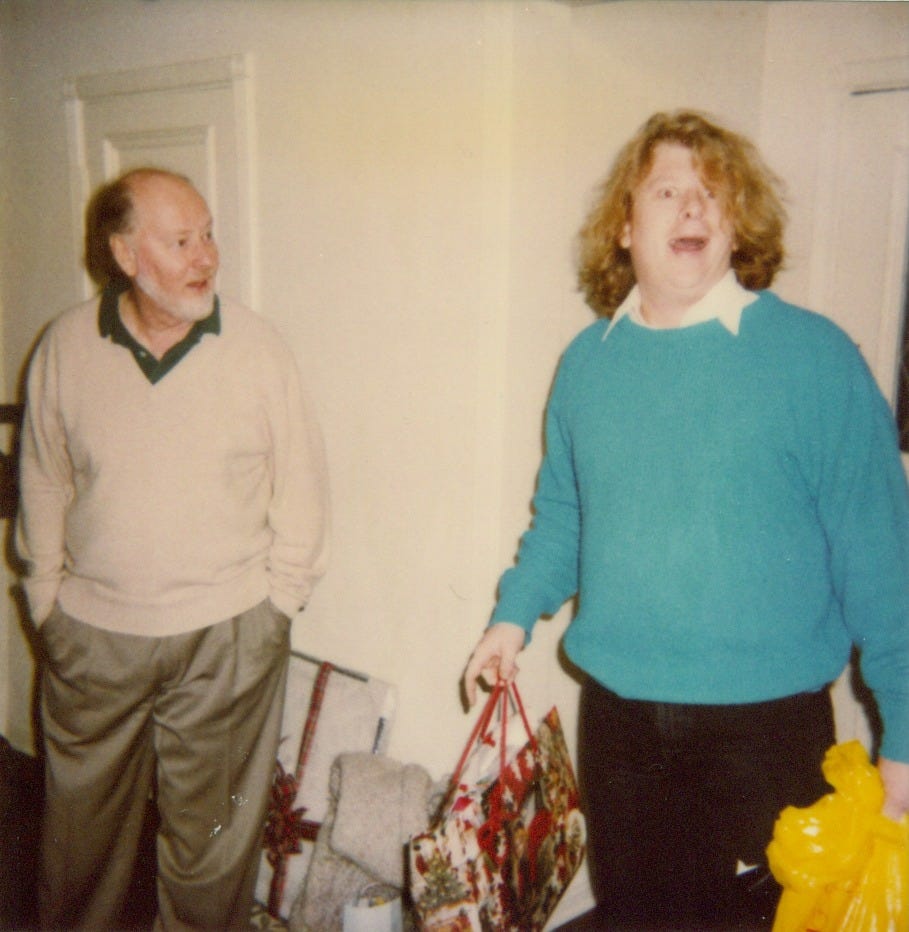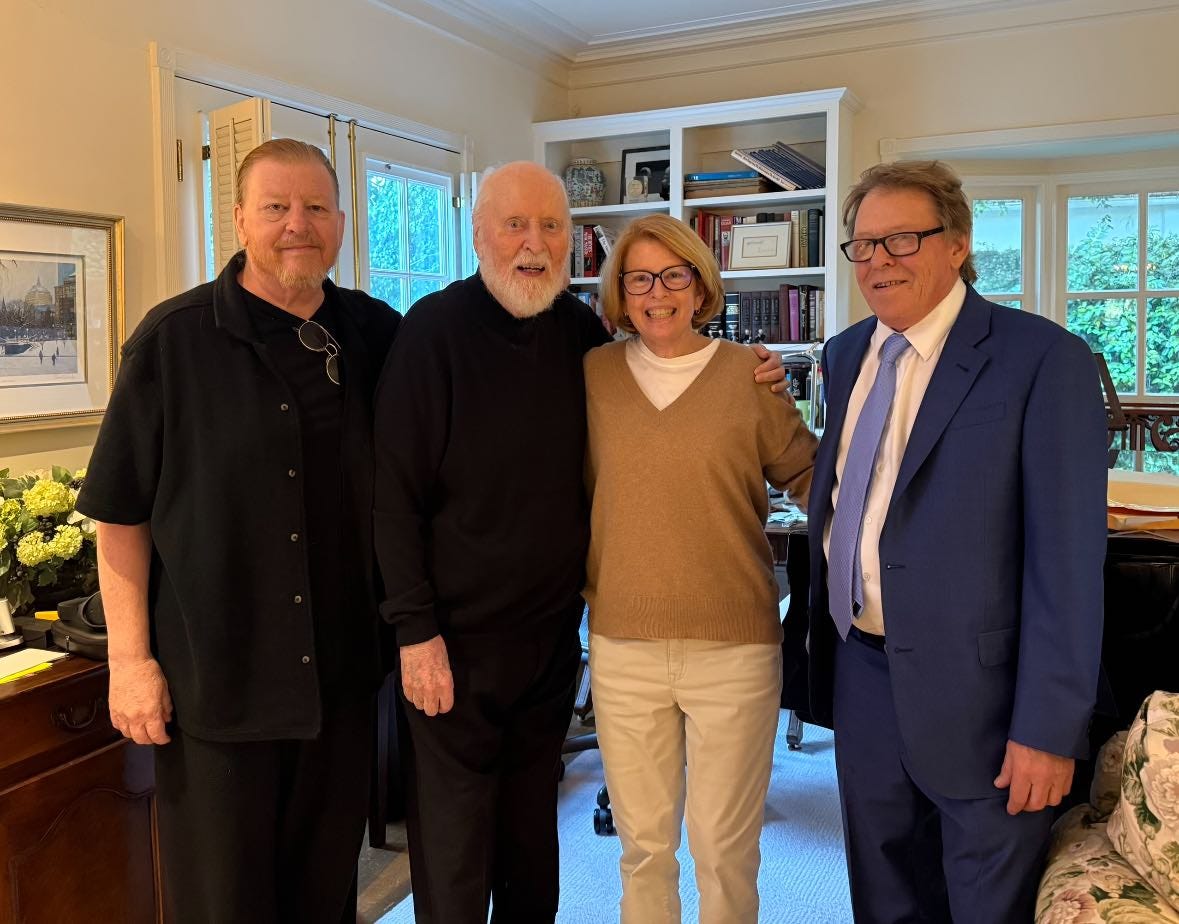It’s hard being the child of an incredibly famous person. Dad’s always working, then suddenly he starts winning Oscars—and then he becomes an international celebrity, constantly hounded for interviews and autographs, rabid fans and other famous people alike always grabbing at the hem of his garment. The sheer volume of adulation and worship always being poured on your famous father can be a heavy burden to bear, along with the ever-present awareness that Dad is a Genius.
John Williams’ kids have weathered all of these challenges and more, and it wasn’t always easy growing up in his shadow. But today I want to focus on their own, lesser known talents and adventures in the entertainment world. All three have, to some degree or another, had their own time in the spotlight.
John’s “little trio,” as he referred to them when they were small, all had musical inclinations—which isn’t surprising given their heritage and whose house they grew up in. Besides their brilliantly multi-talented father, their mother Barbara was an exceptional singer and musician in her own right (she was even interested in the drums early on).
Jenny played the flute and violin; Mark tried the cello but gravitated toward the drums (just like his grandfather and two uncles before him), and Joseph messed around with trumpet and piano before realizing his best instrument was his voice.
“I was the one that didn't stick with anything,” Joe told me. “But my sister is probably the best musician.”
“Well, that's what my dad said,” Jenny responded. “I certainly don't know if that's true. But maybe what they mean by that is that I studied classical music pretty seriously throughout my childhood and adolescence, and got pretty good at the flute. And so for a couple of years in high school, both my dad and I thought that I would probably end up being a flautist—and that made him very happy. We would play duets together at home. He’d play piano, I’d play flute—Mozart, Fauré, Poulenc. Incredibly wonderful experience doing that with him. Another way for us to bond.”
As young kids, they formed their own band: “The Misfits.” And as they got older, both Williams boys formed bands with their friends—which they found much more interesting than school—and sometimes cajoled their sister into singing with them.
Once Jenny got to college, she decided she didn’t want to play flute anymore—but she did try her hand at acting. This talent she also inherited; her mother was an actress (Barbara Ruick’s biggest role was in Carousel), as was her maternal grandmother, Lurene Tuttle—a huge radio star who also had a role in Psycho and lots of TV credits.
When, after college, Jenny was debating between going to graduate school and pursuing acting, her grandmother (nickname “Gaga”) told her: “You gotta act! I'll help you.” Her very first job, in 1979, was playing the “Shamrock Shake girl” in a McDonald's commercial.
Her grandmother helped her with the accent. “All the other girls that came in were just reading it as it was written,” she told me, “but I did it with an Irish brogue—which got me the job.”
She had bit parts in a few TV movies (long forgotten, even by her). And because of the timing and where John was in his timeline, she landed a role as a USO girl in Steven Spielberg’s 1941. “I worked on that movie for 10 weeks, and spent 10 weeks in my trailer,” she laughed.
“They hired six USO girls, but they didn’t really need us until they needed us. Then, the last week of shooting they called my name. So I went in and did this scene, and I was like: Cool, I actually did a scene! This is so awesome—I’m gonna be in it!
When the movie came out, I went to the premiere and I took a date. I didn’t say anything; I was like: He’s gonna be so impressed when he sees this. So of course we’re watching and when we get up to the point where my scene is about to happen… it was cut [laughs].”
That’s Hollywood for ya. The funny thing is: Jenny’s name is still in the end credits.
Not long afterwards, Jenny did go to graduate school and got a degree in educational psychology and counseling. (She still practices today.)
Mark Williams never quit playing the drums. Percussion was, in some ways, more of a Williams birthright than even composing, and he got his very first lessons from his grandfather, Johnny Williams, Sr.
And he was good—good enough to hang with many of his session musician friends who formed the band Toto. During the 1980s, Mark played on a Don Henley solo album, toured with Crosby, Stills and Nash, and—most impressively to my wife—played the drums on Cher’s “If I Could Turn Back Time.”
Mark also wrote and arranged songs himself; he co-composed “A Thousand Years” on Toto’s 1988 album, The Seventh One, along with David Paich and Toto’s new lead singer—Joseph Williams.
In the ’90s Mark started his own band, Lionel’s Dad—a reference to his son, whom he named after John’s best friend, Lionel Newman. He made seven albums under that moniker… and I believe he’s working on another as we speak.
Joe Williams inherited his mom’s pipes. (John Williams sings, too… just not in public.) From the start, he had incredible range, power, and a gorgeous timbre—and he shared his voice with the world on the national television show, Star Search, in 1983.
By this time Joe had already cut his first (self-titled) record, and even earlier he had sung on a few original source rock songs in The Fury—which his dad scored.
Joe also wrote and sang original songs featured in Twilight Zone: The Movie, The Goonies, and SpaceCamp—carving out a kind of pop parallel to his father’s film career. He also helped with some of the source music in Return of the Jedi.
“I think it was just a means of maybe being able to spend time together,” Joe said. “It was always very sweet. But it always had to be something that I could do, that would work, otherwise he would never ask.”
All of this activity, and just the undeniable quality of his voice, put Joe on the radar of the folks at Disney—who hired him to sing the theme song for Adventures of the Gummi Bears in 1985.
Even more significantly, Disney invited Joe to provide the singing vocals of adult Simba in The Lion King. That’s Joe’s mellifluous tenor at the end of “Hakuna Matata” and on the all-time Disney ballad: “Can You Feel the Love Tonight.”
Backing up a little: Joe successfully auditioned to become Toto’s new lead singer starting on the album Fahrenheit in 1986. (He was not the vocalist on their earlier hits like “Rosanna” and “Africa.”) Two years later, they had a hit with “Pamela,” which Joe co-wrote. The music video gave him, and his mullet, a starring role.
Drug problems, which Joe has been very open about, got him booted from Toto shortly after they released The Seventh One—but then in 2010 he was invited to rejoin the band, and he’s been singing to sold-out stadiums and arenas around the world ever since. I saw him with Toto at the Hollywood Bowl last summer, and it was an absolute blast.
Toto has some interesting connections to film music—and to John Williams. Co-founder David Paich’s father, Marty Paich, was a composer and sought-after orchestrator for other composers; he mentored James Newton Howard, who also played many rock and pop sessions with the Toto guys early in his career. And Toto scored David Lynch’s Dune in 1984 (Howard actually arranged a few cues).
Back in the ’60s, Marty Paich wrote some music for the first TV show that John was the lead composer on—Checkmate—and he was also friends with many of John’s hep set. Then, when David Paich was a young session musician, he played on John’s 1973 score for Cinderella Liberty. And in 1988, when John was scoring The Accidental Tourist, Joe and a couple of the Toto guys (primarily Steve Pocaro) did a synth mockup of some of that score. “That was for fun,” Joe explained. “I guess we wanted him to hear what his music would sound like all done with samples and synths.” (None of this was released or used in the film.)
And Joe himself got into scoring; he did several low-budget movies and TV series, eventually working on a few shows with W.G. “Snuffy” Walden. Sometimes he would ask John for advice:
“There were several times where I was asked on a particular television show to do a cue, or to do something that was a little bit out of my realm of knowledge. Specifically there was a bit in one of these TV shows where they needed a knockoff of the I Dream of Jeannie theme. And arranging that kind of stuff, especially on samples and stuff like that, eluded me; I needed to talk to somebody who not only knows what that is, and knows how that should sound, but was there writing for TV at that time. So I would very easily make a phone call, and he would coach me.”
I asked David Paich what he thought Joe and John Williams have in common, and he said:
“They have points of humor that they share. And I think Joseph has some of the musical sensibilities that his dad does when it comes to voicing chords and voicing trumpets and piano, and especially vocal arranging. He’s an incredible vocal arranger, because he gets these tight harmonies—not unlike John. Whenever we’re doing a mockup or doing an arrangement that has brass or strings or something, he’ll always add in some kind of dissonant note, or beautiful suspension that he will attribute his father as influencing it.
So he does carry a bit of Pop’s influence.”
Today, John and his children have a wonderful relationship. All three Williams kids clearly bear traces of his musical talent—and his sweetness.
And look: they were all together this weekend!











Beautiful! And the serendipity of, as a small kid, being in awe of both those big orchestral film scores (that I would later understand came all from the same mind) and the songs of a rock band called Toto (even though in those early years Joe wasn't their lead singer, but I loved "Pamela" and in the late 80's I wasn't able to connect the dots and understand those two Williamses were related).
My head is spinning with all the interconnections here. Amazing.